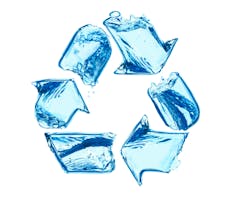Q&A: Key trends in industrial water reuse, implementation challenges and the future of sustainability
Across industrial sectors, water reuse is playing an increasingly important role in helping companies navigate water scarcity, reduce environmental impact, and improve operational resilience. As industries adapt to mounting pressures from climate change and resource constraints, solutions like advanced treatment technologies, decentralized systems, and resource recovery are becoming critical components of sustainable water management.
In recognition of Women’s History Month, this Q&A with Katie Peach, Domain Leader – Municipal and Industrial Reuse at Veolia Water Technologies & Solutions, explores key trends in industrial water reuse, implementation challenges, and the future of sustainability in the sector — alongside insights shaped by her experience as a woman in the water industry.
What are some emerging trends in water reuse in process manufacturing?
Water reuse is critical for process manufacturing as it helps companies maintain production levels despite growing water scarcity, while reducing operational costs and environmental impact in an era where industrial expansion is placing unprecedented demands on limited freshwater resources.
Some trends that we are seeing in this application of water reuse include 1) decentralized treatment systems for point of use recycling, decreasing both wastewater discharge and the reliability on fresh water, 2) advanced treatment technologies such as reverse osmosis to recycle water to higher qualities, thereby increase the opportunities for reuse, 3) resource recovery from wastewater streams, capturing valuable compounds such as minerals and chemicals that might otherwise be lost, and 4) zero liquid discharge (ZLD), eliminating wastewater discharge through advanced treatment and water recycling.
How can process manufacturers overcome implementation challenges as it relates to water reuse at their facilities?
A challenge to implementation of water reuse for process manufacturers can be the lack of clarity on regulations; while many states such as California, Florida, Colorado and Arizona have been creating regulations regarding municipal reuse, such regulations are less clear for manufacturing applications. Early engagement with regulatory bodies, if applicable, can be helpful in overcoming this challenge to establish clear water quality standards and monitoring protocols. Piloting is also a highly effective way to test and demonstrate a process and validate if it will be sufficient to meet the needs of a reuse system.
Partnerships between process manufacturers and technology providers are a great way to gather expertise and support for evaluating water reuse needs and opportunities. Technology providers can also help facilitate pilot testing and provide ongoing process support once a reuse system is in place.
What do you see as the future of water sustainability in industrial settings?
I believe that a circular economy will be a key approach to water sustainability in the future. A focus on resource recovery will see industrial water users mining their wastewater to recover important components such as minerals, in addition to reusing water in closed loop systems.
Digital tools such as digital twins and smart water management will also play an important role in improving water use efficiency and sustainability, through a higher-level view on sustainability that will also include a consideration of greenhouse gas (GHG) emissions from treatment.
How has your experience as a woman in the water industry shaped your perspective on advancing sustainable water reuse solutions?
As a woman in the water industry, being part of an underrepresented group has made me realize that the most innovative solutions emerge when diverse perspectives are brought to the table. Being often the only woman in the room has made me aware of how different viewpoints can illuminate challenges that might otherwise be overlooked. This has strengthened my conviction that diverse teams - incorporating different genders, cultural backgrounds, and technical expertise - are essential for developing comprehensive water solutions. Teams with varied backgrounds will consistently deliver more successful water reuse projects.



